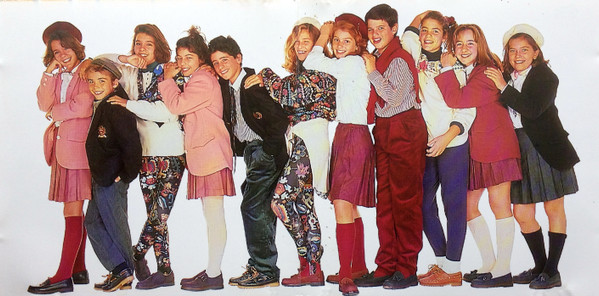The Ministars were the first Portuguese children’s music group.
The Ministars began as a musical group made up of boys and girls aged between ten and twelve years old, which, at Christmas 1986, released their first LP. This record had an immediate and extraordinary success.
António Manuel Rolo Duarte imported this idea from the Netherlands, where there was already a group with similar characteristics. The formula found was a kind of “Columbus’ egg”: it consisted of selecting a group of children (in this case, recruited first from the Children’s Choir of Santo Amaro de Oeiras and, later, from Casa Pia in Lisbon), organizing a repertoire with the greatest national and international hits of the moment and, in the latter case, making versions of the songs in Portuguese, staging a modern choreography, with the latest children’s fashion wardrobe (for stage and television shows) and giving themes a treatment very close to the originals.
Teresa Garcia was its first choreographer and implementer of the Ministar style. José Niza made the first Portuguese versions of the international hits performed by the group. In 1992, Amadeu Diniz da Fonseca replaced him. Later, Renato Carrasquinho would assume this activity. As for the musical arrangements, these were first carried out by José da Ponte and, later, by Jorge Quintela, while the direction of the small singers was ensured, first, by Maestro César Batalha, and, years later, by Renato Carrasquinho.
Silver, gold and platinum discs have awarded all of their works, which have been in the top spots of national sales for several years and allowed the group to be present in many Portuguese television programs. The Minstars became sales record holders in Portugal.
There were many live performances with tours throughout the country and the Autonomous Region of Madeira. There are two mega-shows: one at the Coliseu dos Recreios with the collaboration of the Santo Amaro de Oeiras Children’s Choir and another at the Loucuras space. These shows were very demonstrative of the enormous popularity of this musical group. The Ministars were also an assiduous presence in many entertainment programs on RTP – Rádio e Televisão de Portugal.
They collaborated in television campaigns for the Portuguese Road Prevention, Pirilampo Mágico[2] and the Fight Against Drugs. For their participation in these campaigns, some of the elements of the second formation of the group were received at the Palácio de Belém by the President of the Republic of Portugal, Dr. Mario Soares. In 1990 and 1991 they received the Popularity Prize awarded by the Casa da Imprensa de Lisboa during the Grande Noite do Fado.
They created a style, a way of being young, being much appreciated by the younger age groups. The “Clube dos Amigos dos Ministars” was formed, which maintained regular correspondence, taking an interest in everything that was happening with the group; this club had members from all over Portugal, the Autonomous Regions, Cape Verde, São Tomé and Príncipe and also France.
The group ceased to be part of the Coro Infantil de Santo Amaro de Oeiras universe in 1994, due to a change in the criteria and orientation of the publisher. The musical catalog of the Ministars that had been recorded and edited, until then, on the Edisom record company, was acquired by Movieplay Portuguesa, which re-edited almost all the albums on CD and also produced a new collection with some of the greatest hits.
In 2006, Renato Carrasquinho, in charge of the group, in addition to making the adaptations, choosing the musical repertoire and handling the rehearsals, was invited by the publisher Movieplay Portuguesa to produce all future Ministars record albums to be released on the market.





